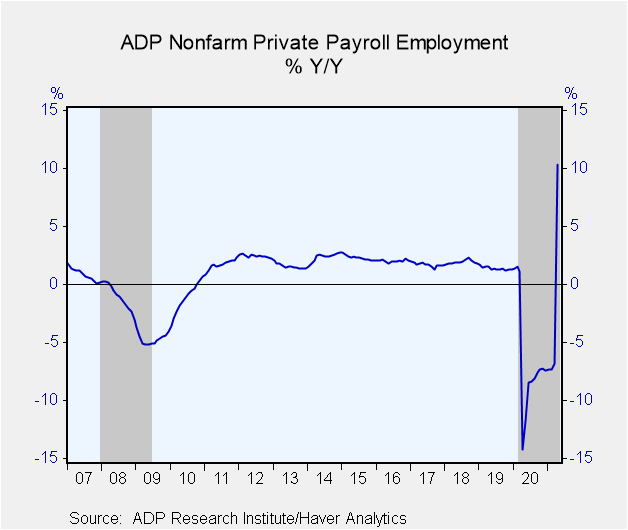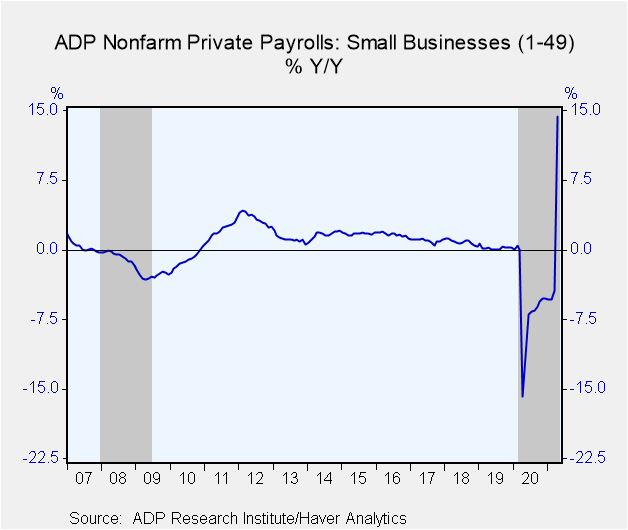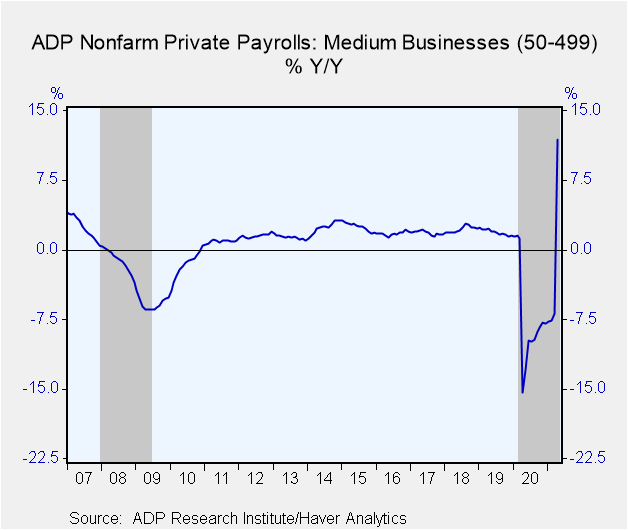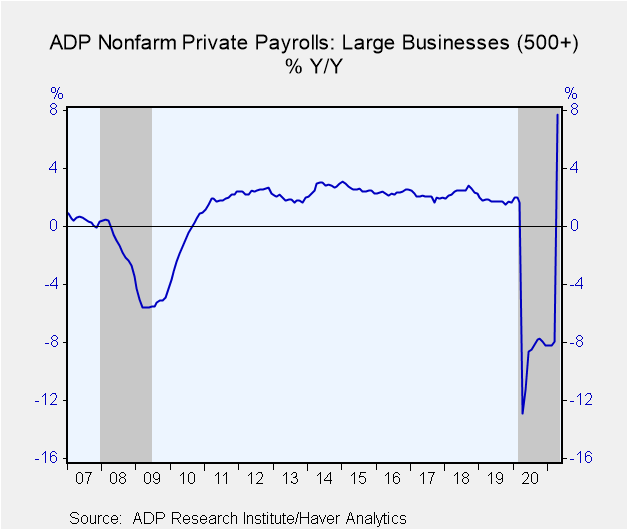 Global| May 05 2021
Global| May 05 2021U.S. ADP Nonfarm Private Payroll April Gain Disappoints
by:Tom Moeller
|in:Economy in Brief
Summary
• Jobs expand for a fourth consecutive month. • Improvement extends throughout company size. • Factory & construction workforces continue strong. Job market improvement continued last month as businesses reopened and Covid-19 [...]
• Jobs expand for a fourth consecutive month.
• Improvement extends throughout company size.
• Factory & construction workforces continue strong.
Job market improvement continued last month as businesses reopened and Covid-19 vaccinations picked up. The ADP National Employment Report indicated that April nonfarm private sector payrolls increased 742,000 (10.4% y/y). An 800,000 increase had been expected in the Action Economics Forecast Survey. The rise followed a 565,000 March gain, revised from 517,000 and a 180,000 February increase, revised from 176,000.
Large-sized payrolls increased 277,000 (7.7% y/y) following a 167,000 March rise, revised from 155,000. Medium-sized payrolls increased 230,000 (11.9% y/y) after rising 204,000 in March, revised from 188,000. Small-sized payrolls improved 235,000 (14.3% y/y) after rising 194,000 in March, revised from 174,000.
Within industry sectors, private service employment increased 636,000 (10.7% y/y) after rising 468,000 in March, revised from 437,000. A 237,000 surge (45.4% y/y) in leisure & hospitality hiring followed a 193,000 March gain and was the largest increase since June of last year. Jobs in trade, transportation & utilities rose 155,000 (7.9% y/y) after increasing 93,000 in March. A 104,000 rise (5.5% y/y) in the number of professional business services jobs followed a 78,000 gain. The number of education & health services jobs rose 92,000 in April (7.6% y/y) and have risen in each month since May of last year. Jobs in financial services rose 11,000 (1.5% y/y), the smallest increase since September. The number of information sector jobs fell 3,000 (-1.8% y/y), down for the sixth straight month.
Employment amongst goods-producing firms increased 106,000 (8.7% y/y) after improving 98,000 in March, revised from 80,000. The number of factory sector jobs strengthened 55,000 last month (7.1% y/y) after rising 47,000. The size of construction sector payrolls rose 41,000 in April (12.3% y/y) following a 48,000 increase. Employment in the natural resource & mining sector rose 10,000, the largest increase in nine months, and they were unchanged y/y.
The Automatic Data Processing Research Institute survey covers 411,000 companies and includes about one-fifth of U.S. private payroll employment. The data are processed by Moody's Analytics Inc., then calibrated and aligned with the BLS establishment survey data. The ADP data cover private sector employment only.
The ADP National Employment Report data can be found in Haver's USECON database. Historical figures date back to 2001 for private employment and the industry breakdown, and 2005 for the business size breakout. The expectation figure is available in Haver's AS1REPNA database.
The Economic Outlook and Implications for Monetary Policy from Fed Governor Michelle W. Bowman is available here.
| ADP/Moody's National Employment Report | Apr | Mar | Feb | Apr Y/Y % | 2020 | 2019 | 2018 |
|---|---|---|---|---|---|---|---|
| Nonfarm Private Payroll Employment (m/m chg, 000s) | 742 | 565 | 180 | 10.4 | -6.4 | 1.4 | 1.9 |
| Small Payroll (1-49) | 235 | 194 | 51 | 14.3 | -5.8 | 0.2 | 0.8 |
| Medium Payroll (50-499) | 230 | 204 | 78 | 11.9 | -7.2 | 1.9 | 2.2 |
| Large Payroll (>500) | 277 | 167 | 50 | 7.7 | -6.3 | 1.7 | 2.4 |
| Goods-Producing | 106 | 98 | -15 | 8.7 | -4.1 | 1.5 | 3.0 |
| Construction | 41 | 48 | -12 | 12.3 | -2.5 | 2.5 | 4.4 |
| Manufacturing | 55 | 47 | -7 | 7.1 | -4.7 | 1.0 | 2.1 |
| Service-Producing | 636 | 468 | 195 | 10.7 | -6.8 | 1.3 | 1.7 |
Tom Moeller
AuthorMore in Author Profile »Prior to joining Haver Analytics in 2000, Mr. Moeller worked as the Economist at Chancellor Capital Management from 1985 to 1999. There, he developed comprehensive economic forecasts and interpreted economic data for equity and fixed income portfolio managers. Also at Chancellor, Mr. Moeller worked as an equity analyst and was responsible for researching and rating companies in the economically sensitive automobile and housing industries for investment in Chancellor’s equity portfolio. Prior to joining Chancellor, Mr. Moeller was an Economist at Citibank from 1979 to 1984. He also analyzed pricing behavior in the metals industry for the Council on Wage and Price Stability in Washington, D.C. In 1999, Mr. Moeller received the award for most accurate forecast from the Forecasters' Club of New York. From 1990 to 1992 he was President of the New York Association for Business Economists. Mr. Moeller earned an M.B.A. in Finance from Fordham University, where he graduated in 1987. He holds a Bachelor of Arts in Economics from George Washington University.
More Economy in Brief
 Global| Feb 05 2026
Global| Feb 05 2026Charts of the Week: Balanced Policy, Resilient Data and AI Narratives
by:Andrew Cates










